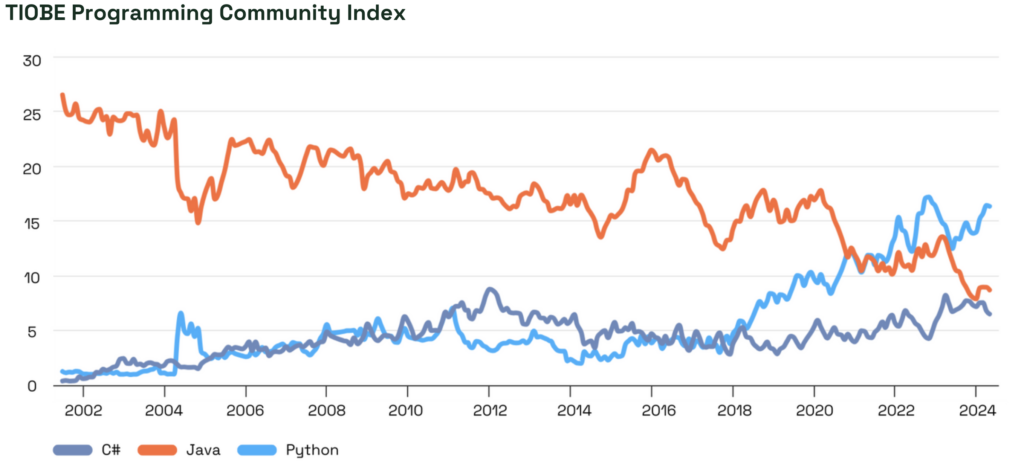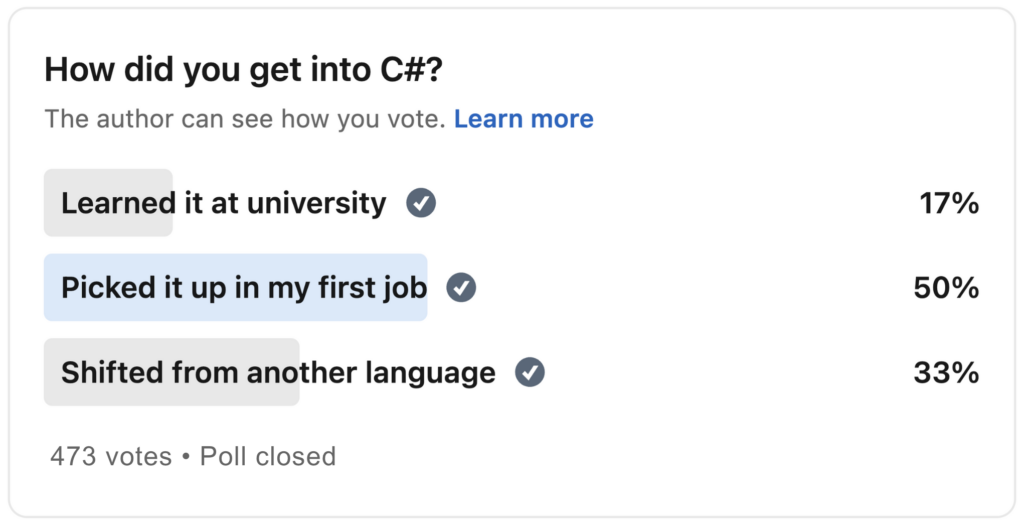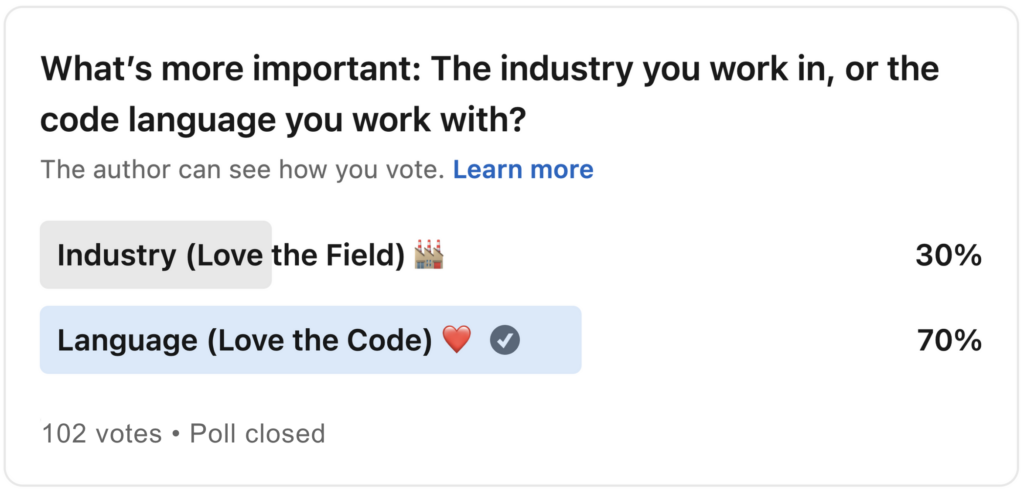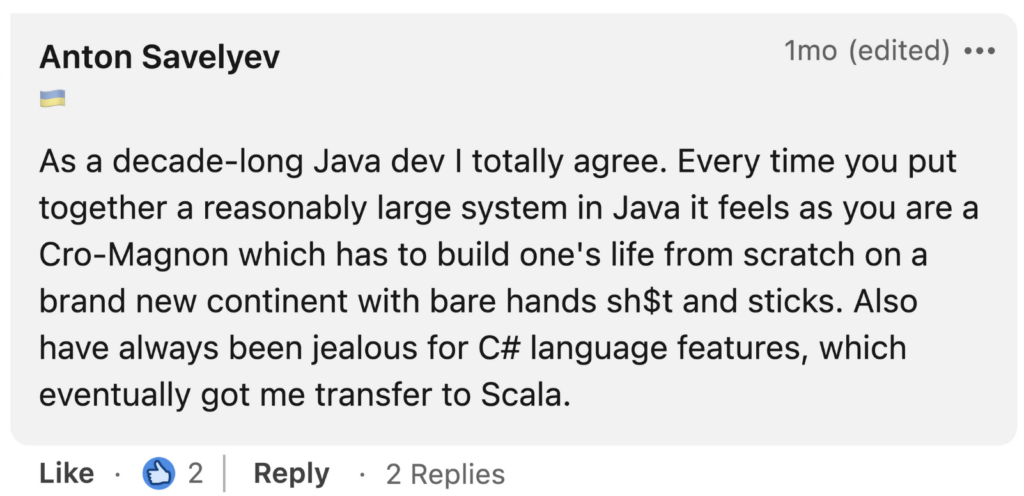C# is like the best friend in a rom-com – always there, super reliable, but never seen as the love interest until the very end. Even though C# has been growing in popularity, it still hasn’t hit the heart-throb status of Java or Python. So, who actually cares about C#?

The ‘Windows only’ reputation C# picked up in the early 2000s has been tough to shake.
As a result, C# isn’t the first language universities turn to or that developers rush to learn. Instead, C# is a language most developers fall into, and then fall in love with.
Talking about love, there’s a strong community of developers who won’t hesitate to battle it out in the comments to defend C#, and you may well be one of them too. But, when you’re looking to scale, finding these passionate individuals, especially early in their careers, can be challenging.
So, join me as I review insights collected from my network to answer the question: who really cares about C#? And, most importantly, how you can go about hiring the people who do. Because let’s face it, when you’re building a team, passionate people make all the difference.
C#’s early 2000s reputation
It’s no secret. Microsoft was slow to make C# accessible. As a result, it still carries around an early 2000s reputation on par with Robert Downey Jr’s. Here are some of C#’s early features that have cast a shadow on its reputation today:
| 🏆 Competition from Established Languages |
| C# faced stiff competition from well-established languages like Java, which already had a large developer community, extensive ecosystem, and cross-platform support. |
| 🚧 Limited IDE Options |
| Visual Studio was the primary integrated development environment (IDE). This deterred developers looking for cross-platform solutions. |
| ❗ Limited Deployment Options |
| Early C# development with the .NET framework focused on Windows servers. These required an expensive Windows operating system license. |
| 🔒 Vendor Lock-in Concerns |
| Many couldn’t commit to C# and the .NET framework, fearing being tied exclusively to Microsoft’s ecosystem, limiting their ability to migrate to other platforms and technologies. |
| 💰 Support Required Paid Subscriptions |
| And if you needed a helping hand? Well, you’d better have had your wallet ready for a Microsoft Developer Network subscription. |

C#’s growing popularity
Just as Robert Downey Jr. turned things around with Iron Man, Microsoft eventually made C# more accessible. Not only have they amped up their support game, C# is now truly cross-platform. .NET Core has made it so developers can write and run C# applications on various platforms including Windows, macOS, and Linux.
As a result, C# has grown in popularity over the years. In January ‘24, C# won the TIOBE “Programming Language of the Year” award for the first time by seeing the highest growth in ratings. It now stands as the fifth most popular coding language, and it looks like it’s even closing in on Java.

C#’s image problem
Despite all the upgrades, C# doesn’t have a PR team as slick as Robert D.J.’s, so there are plenty of myths still floating about.

“The biggest downside to using C# (or .NET in general) is probably the preconception that many folks still have about it; much of which stems from the old days before it went Open Source and cross-platform. That, plus the fact few people seem to learn it early in their careers or get taught it at school/university. It’s still seen as ‘Windows only’ or a purely ‘Microsoft product’, which hasn’t been the case for years.”
C#’s image problem has stifled its growth and as a result, few people learn C# early in their careers. In the US, studies have shown that Java and Python are the most commonly taught languages in Computer Science 1. In the UK, it’s Java, which is taught in over half of courses.
Python and Java are favoured for different reasons. In the UK study, educators ranked Python highest for its ‘pedagogical benefits’, meaning it’s easier to teach and learn. Java, on the other hand, is popular because it’s ‘object-oriented’. Although C# is also an object-oriented language, institutions likely stick with Java because of its long-standing presence in academia and industry, giving educators little reason to switch.
As a result, it’s unsurprising that most people fall into C# and then fall in love.

So, who cares about C#?
I asked my C# LinkedIn network the ultimate question: if you could only pick one for the rest of your life a) the industry you work in, or b) the language you code with, which would you pick?

70% voted for coding language.
There’s a community of developers out there who are so passionate about C# that they’re willing to forgo the industry they work in to use the language they love.
Take, for example, those who defend it religiously on LinkedIn. Here’s one of my favourite comments about C# vs. Java, in a debate I may or may not have started to stay entertained at work…

Build a C# obsessed team
Hiring in the C# space is more challenging compared to Java or Python. For junior developer roles, professionals are particularly scared of limiting their skills, so misconceptions about C# being ‘Windows only’ can hamper your hiring efforts.
On top of finding talent with the right skill set, you want to hire developers who are truly passionate because that’s the difference between good and great code.
That being said, passionate developers aren’t easy to find. They’re often snapped up quickly, and convincing them to join your team requires more than a competitive salary. You need to demonstrate a compelling vision, a culture that values their expertise, and a genuine appreciation for the language they love.
The good news? There are steps you can take to maximise your chances of hiring developers who will become the backbone of your team.
Attract
As a rule of thumb, include more information in the ‘about the role’ section than in ‘requirements’. Detailing day-to-day tasks and the types of projects candidates will work on allows them to self-select out of the process if it doesn’t align with their skill set. This removes the need for an off-putting list of requirements, which offers candidates nothing in return.
Consider outlining the following:
- Is it mostly maintenance and support, or building new solutions and systems?
- Will they be involved in the architecture and design of new systems and applications?
- Are they going to be working in an Agile environment?
Select
Developer CVs can be a mixed bag. You might find some that list every programming language imaginable, while others offer in-depth project descriptions but lack details on the technologies used.
The bottom line is that CVs aren’t always accurate reflections of a person’s coding ability. Speaking to these candidates is crucial to assess their fit before starting formal interviews. This is by no means the quickest or easiest approach, especially if you’re reaching out to someone who isn’t actively seeking a new role. But this is how you find the best developers, not just the people with the best CVs.
Engage
To assess passion, you need to ask the right questions at the interview stage:
- What are the best ready-to-use/structural features? This gets them talking about some of their favourite aspects of the language.
- What’s your favourite update? This tells you if they’re keeping up with the language’s development, beyond their daily tasks.
- What projects have you enjoyed? How did C# allow you to excel in them?
If you’ve followed all the steps above, and the interview is going well, the chances are the person sitting opposite you is a passionate C# developer. To convince them to sign on the dotted line and accept your offer, they need to know the feeling’s mutual.
A great way to show this is to create more dialogue in the interview process. This could be as simple as ditching the coding test for a technical interview. To learn more about this, check out my latest blog post, Why Coding Tests Are a Load of Rubbish.
It’s also important to show your candidates some love. Share your vision for the business and how you see them contributing to it. Invite them to meet different team members or even to come to the office for their final-round interview.
On the mend…
C#’s reputation is on the mend. Remember, time heals all wounds, even those of Microsoft. But for now, most developers still stumble upon C# and then fall in love with it. This means you’ll need to work harder to hire not only skilled but also passionate candidates, because trust me, they’re in high demand.
Hiring can be time-consuming, particularly the screening process. If you need help, please know that I’m just a call away. I lead the C# development desk here at Cititec Talent and can assist at every stage of the hiring process. I assess candidates’ motivations, passion, and skills while ensuring I effectively sell the role and your company to them.
In a nutshell, I present you with people who can do the job well. Then, all you need to do is decide who you want to work with. Because, at the end of the day, success at any company ultimately depends on one thing: hiring the right people.

Looking for more insights?




